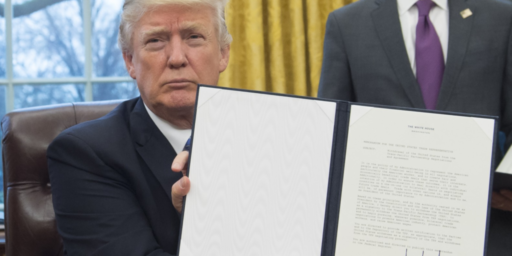Facebook Co-Founder Renounces U.S. Citizenship Prior To IPO
Eduardo Saverin, one of the group of people that helped Mark Zuckerberg start Facebook, has renounced his U.S. citizenship in advance of the company’s multi-billion dollar Initial Public Offering:
Eduardo Saverin, the billionaire co- founder of Facebook Inc. (FB), renounced his U.S. citizenship before an initial public offering that values the social network at as much as $96 billion, a move that may reduce his tax bill.
Facebook plans to raise as much as $11.8 billion through the IPO, the biggest in history for an Internet company. Saverin’s stake is about 4 percent, according to the website Who Owns Facebook. At the high end of the IPO valuation, that would be worth about $3.84 billion. His holdings aren’t listed in Facebook’s regulatory filings.
Saverin, 30, joins a growing number of people giving up U.S. citizenship, a move that can trim their tax liabilities in that country. The Brazilian-born resident of Singapore is one of several people who helped Mark Zuckerberg start Facebook in a Harvard University dorm and stand to reap billions of dollars after the world’s largest social network holds its IPO.
“Eduardo recently found it more practical to become a resident of Singapore since he plans to live there for an indefinite period of time,” said Tom Goodman, a spokesman for Saverin, in an e-mailed statement.
Saverin’s name is on a list of people who chose to renounce citizenship as of April 30, published by the Internal Revenue Service. Saverin made that move “around September” of last year, according to his spokesman.
It may help him cut the tax bill stemming from his Facebook stake, and avoid capital gains taxes on his future investments. Singapore doesn’t have a capital gains tax.
Saverin won’t escape all U.S. taxes. Americans who give up their citizenship owe what is effectively an exit tax on the capital gains from their stock holdings, even if they don’t sell the shares, said Reuven S. Avi-Yonah, director of the international tax program at the University of Michigan’s law school. For tax purposes, the IRS treats the stock as if it has been sold.
Renouncing your citizenship well in advance of an IPO is “a very smart idea,” from a tax standpoint, said Avi-Yonah. “Once it’s public you can’t fool around with the value.”
Saverin’s estimated gain, and subsequent tax bill, would be based on an appraisal by his tax advisors. They could have valued his Facebook stake at less than it will be worth once shares trade publicly, reducing his liability. For tax purposes, Saverin can argue that the value of his stake should be discounted because of the potential difficulty of selling the shares while the company remains private.
So, there is a way to beat Uncle Sam after all.






Not really:
@Chad S:
Yes and no. He does have to pay capital gains on it, but only based on what the value of the stock was when he renounced his citizenship, which was before the IPO. What the value of a privately held stock is, is quite a hard thing to figure out objectively. Each side is going to have accountants that say the value is something different, and they’ll battle it out. But the value is certainly less than it would be after the IPO.
Oh, no, Ayn Rand was right!
I wish the government would deport people who renounce their citizenship, and never, ever let them back in the country for any reason.
@Gustopher:
As does a lot people in Switzerland.
@Ben: Yes, but Im guessing he’ll have a massive US tax bill to settle in any event.
@Gustopher:
“The Brazilian-born resident of Singapore”
It’s hard to deport someone who’s already overseas.
@Chad S:
Massive to you and I, yes. But it’ll be a hell of a lot smaller than he’d face if he stayed here.
Taxes are a four letter word for the super wealthy. Singapore is becoming a haven for tax exiles. Hell, pretty soon some new-age Jagger/Richards combo will pen “Exiles in Singapore.” Capital gains taxes really do affect the behaviour of investors. If Uncle Sam ever did decide to tax the very rich they’d pull up stakes and head elsewhere. Or at least many of them would.
What’s left for Eduardo, purchase the rights to the unmarried Kardashian women?
At some point, but he can defer the tax until he sells the assets.
@Tsar Nicholas:
Probably true about some of the very rich but not sure about the “many.” I think you’d have to be very, very rich –NFL owner rich, not NFL player rich– for “tax exile” to be even remotely attractive. Then to whittle it down even more, you have to be the type of person who doesn’t care about the culture, is comfortable living in a place where you don’t speak the language, can insulate yourself in the wealthiest neighborhoods, etc.
As wealthy as they are, I can see neither Warren Buffet nor the Koch brothers pulling up stakes and finding some tax haven. I don’t even think Mark Zuckerberg would do it, and he has a bigger stake in Facebook than Saverin. These guys still have work to do.
Sounds like Saverin basically retired to Singapore and now wants the senior discount.
@Gustopher: I wish the government would deport people who renounce their citizenship, and never, ever let them back in the country for any reason.
Jingoistic xenophobe…
What Eduardo Saverin owes America. (Hint: Nearly everything.)
Is this fair? No. It’s worse than that, though. It’s ungrateful and it’s indecent. Saverin’s decision to decamp the U.S. suggests he’s got no idea how much America has helped him out.
@Gustopher:
Word.
@Jenos Idanian:
Where was he calling for a war?